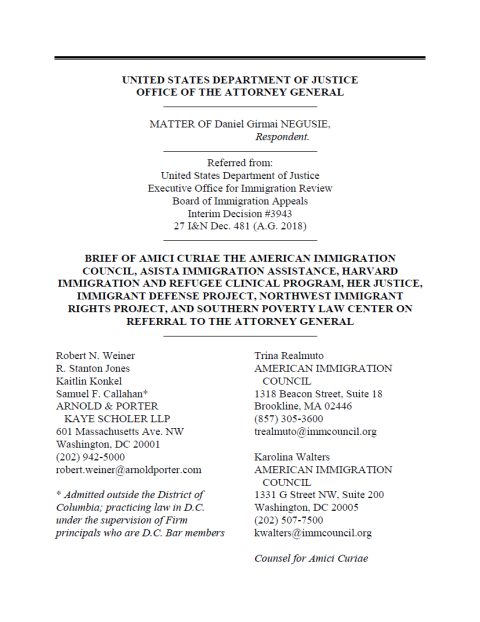Virginia, District 3

Council Files Amicus Brief with Supreme Court on Fair, Consistent Way to Interpret Aggravated Felony Deportation Ground
In this amicus brief the Council urges the Supreme Court to correct the BIA's mistake in not applying that criminal "rule of lenity" when interpreting the aggravated felony deportation ground. Read More

Council Submits Amicus Brief on Two-Step Notice Practice to Supreme Court in Niz-Chavez v. Barr
This amicus brief in Niz-Chavez v. Barr urges the Supreme Court to reject the government’s practice of issuing notice of the time and place of a noncitizen’s removal proceedings in multiple documents over time, instead of in the initial Notice to Appear (NTA), as mandated by Congress. Read More

Matter of Negusie
In Matter of Negusie, former Attorney General Jeff Sessions referred to himself the question of whether coercion and duress are relevant to the application of the immigration statute’s persecutor bar for individuals seeking asylum or withholding of removal Read More

Matter of L-A-B-R-
This amicus brief discusses how Sessions’ public statements indicate prejudgment about the use of continuances and explains how Sessions’ use of the referral authority suggests that he is choosing to refer cases to himself to achieve predetermined political and policymaking goals. Read More

Matter of Castro-Tum
In the case, Attorney General Jeff Sessions referred to himself questions related to administrative closure. This move by Sessions could signal an attempt to end administrative closure altogether—which could force over 350,000 immigrants back into immigration court, exacerbating the challenges of an already overburdened immigration court system. Read More

Ferino-Sanchez v. Sessions — Fourth Circuit
This amicus brief arguing that any Fourth Amendment violation by state and local law enforcement officers — not just egregious Fourth Amendments violations — should require the suppression of evidence in immigration court proceedings, which is the same standard that applies in the criminal justice arena. Read More

Romero-Escobar v. Holder – Ninth Circuit
The Council and the National Immigration Project of the National Lawyers Guild submitted an amicus brief in support of rehearing addressing immigration judges’ duty, in pro se cases, to fully inform litigants of the consequences of their legal decisions and to ensure that any waivers of appeal are knowing and intelligent. The Ninth Circuit denied the petition for rehearing in a non-precedent decision. For more information on this topic, contact the Council's legal department. Read More

In re C-C-C- – Board of Immigration Appeals
The Council submitted an amicus brief arguing that immigration judges’ duty to develop the record is particularly important in pro se litigants’ cases, and that this duty requires immigration judges to provide noncitizens with information about the types of relief they are seeking and to actively elicit relevant information. For more information about this topic, contact the Council's legal department. Read More

Blackman Hinds v. Holder – First Circuit
At issue in the case is whether the Constitution and the immigration laws allow an immigration judge to enter a removal order without considering whether removal would be a disproportionate penalty under the circumstances. The amicus brief by the Council and the Post-Deportation Human Rights Project tells the stories of five individuals who either already have or soon will face the extreme penalty of deportation and a permanent reentry bar for minor or nonviolent crimes committed years earlier. The men and women featured in the brief share many attributes: all were lawful permanent residents; all established significant ties to this country; all left (or will leave) behind U.S. citizen family members; all committed nonviolent crimes; all have demonstrated rehabilitation; and none was afforded the opportunity to explain to the immigration judge why forcible removal from the country was unjustified under the circumstances. The brief throws into stark relief the real life human consequences of stripping judges of the ability to consider the totality of the circumstances before entering an order of removal. Read More

F- P- v. Holder – Ninth Circuit
Long used in criminal trials, motions to suppress can lead to the exclusion of evidence obtained by the government in violation of the Fourth Amendment, Fifth Amendment, or related provisions of federal law. While the immediate purpose of filing a motion to suppress is to prevent the government from meeting its burden of proof, challenges to unlawfully obtained evidence can also deter future violations by law enforcement officers and thereby protect the rights of other noncitizens. The Supreme Court held in INS v. Lopez-Mendoza, 468 U.S. 1032 (1984), that motions to suppress evidence under the Fourth Amendment in immigration proceedings should be granted only for “egregious” violations or if violations became “widespread.” Despite this stringent standard, noncitizens have prevailed in many cases on motions to suppress. Read More
Make a contribution
Make a direct impact on the lives of immigrants.
